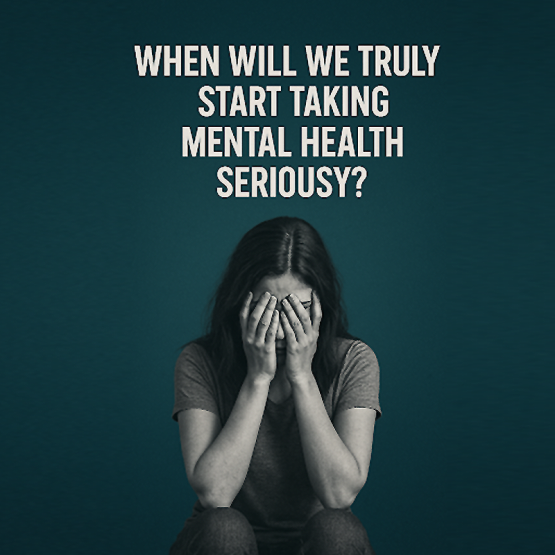
When Will We Truly Start Taking Mental Health Seriously?
In a world where we rush to vaccinate against viruses, wear masks for public safety, and conduct health check-ups to prevent chronic illnesses—why does mental health continue to be treated as an afterthought?
Another life lost.
Another bright future dimmed.
Another family shattered.
A second-year BDS student at a university in Greater Noida died by suicide. She left a note naming two faculty members from Sharda University’s dental department, alleging mental harassment.
This is not an isolated incident.
It's a disturbing pattern.
And yet, we continue to say: "Mental health doesn't matter that much."
We brush it under the rug as if it's just another story.
But it’s not. It’s a systemic failure—of institutions, mindsets, and priorities.
If it were a physical illness, we would act immediately.
We promote physical health proactively—through vaccines, sanitation, and awareness.
But when it comes to mental health:
- We tell people to "man up."
- We dismiss young people’s pain as a "phase."
- We label therapy as unnecessary or shameful.
- We tolerate toxic educational and work environments.
Only after a suicide do we react—and even then, briefly.
Why does this keep happening?
Because:
- We normalize ignoring emotional pain.
- Mental health services are often inaccessible—financially, socially, and culturally.
- There’s no accountability for mental harassment in institutions.
- Students fear retaliation more than they trust support systems.
Mental health is not a luxury. It’s a right.
Suicide is a leading cause of death among Indian youth. Over 1.7 lakh people died by suicide in 2022 (NCRB data). These are real people with dreams—lost because of an invisible crisis.
Prevention is possible—through timely psychological support, safe spaces, ethical faculty behavior, and institutional accountability.
The real question is:
How many more lives must we lose before mental health services become accessible and mandatory?
As a psychologist, I wonder:
- How many could have been saved if therapy wasn’t seen as "too expensive"?
- If college campuses had 24/7 in-house therapists?
- If mental harassment had legal consequences?
We need:
- Genuine integration of mental health in university policy.
- Trained professionals, regular check-ins, and zero tolerance for psychological abuse.
- A culture that frames help-seeking as strength, not weakness.
- Emotional safety to be treated as seriously as physical safety.
Let’s stop waiting for another suicide story to trend.
Let’s stop posting "RIP" while ignoring systemic change.
Let’s stop underestimating emotional pain.
Let’s act. Let’s listen. Let’s care.
Because one life lost to suicide is one too many.